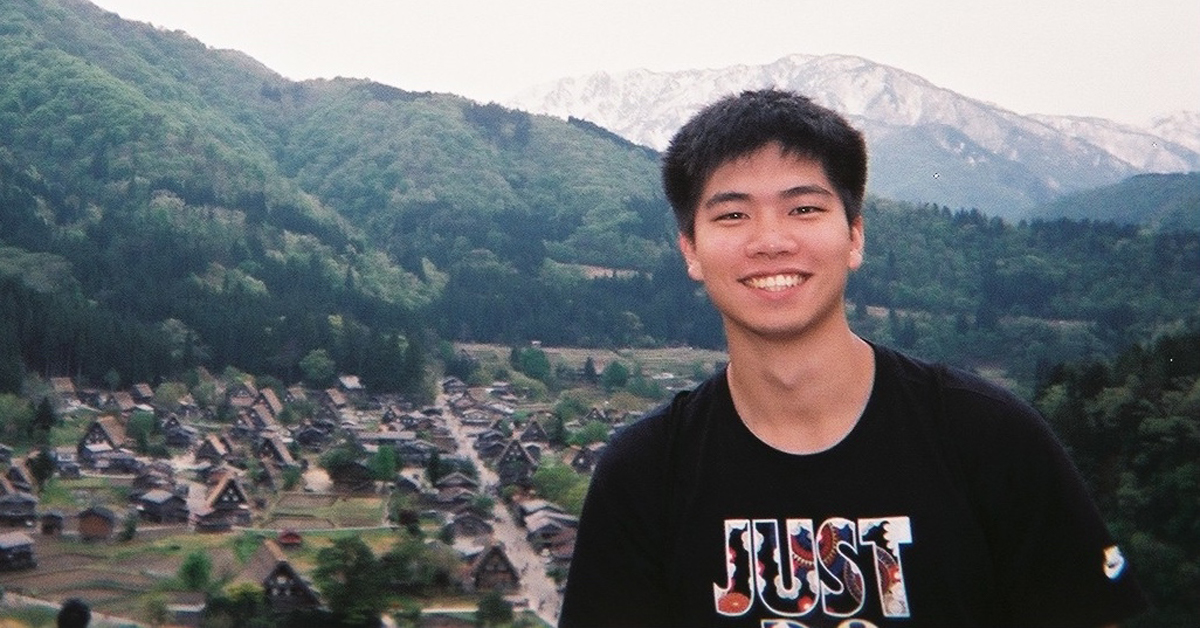Act first, think later: Advice by WISH’s resident assistant to prospective and current students
Thu, Feb 21, 2019-
Tags
Identity struggle during childhood
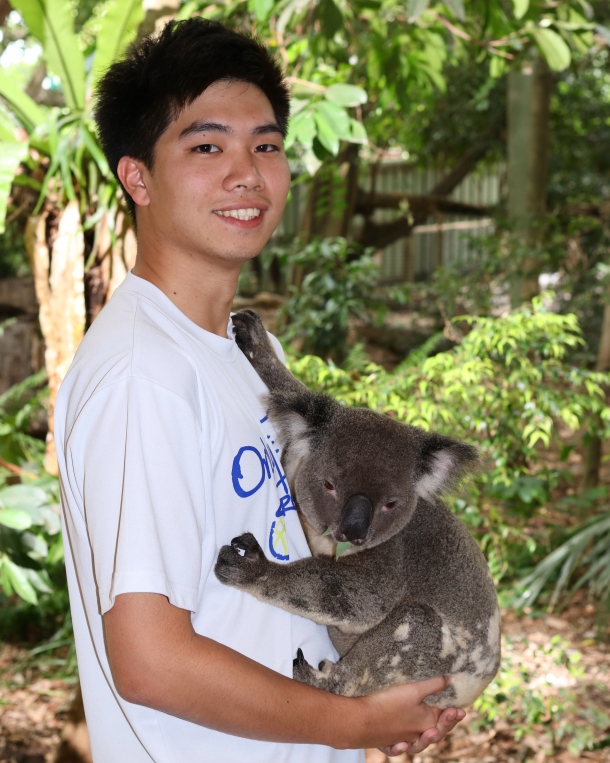
Li Yue, student at School of Political Science & Economics (English-based degree program)
Born in Nagoya but of Chinese descent, Li Yue lived in Japan until he was six because of his father’s work. While he did return to Beijing afterwards, Li Yue came back to Japan again during junior high school, this time in Tokyo. Three years later before entering high school, he had to move to Shanghai, once again due to his father’s work.
Although he is not Japanese by nationality and descent, Li Yue had thought that he was Japanese when he was young because he not only spoke the language but also knew no country other than Japan.
“It was not until I was older that I realized I was Chinese when I first saw my passport and other legal documents. As such, I’d experienced an identity struggle in a very different way compared to people who are born into a bi or multicultural family.”
Why Waseda?
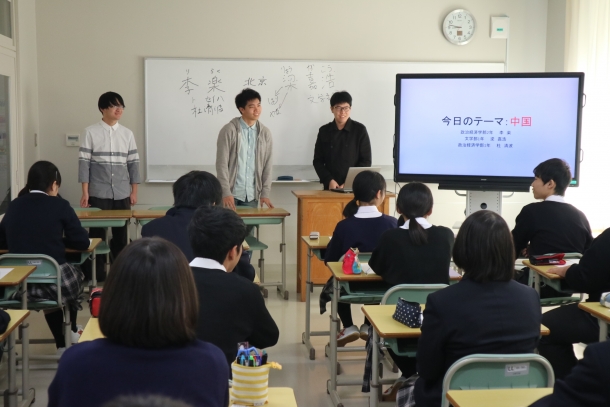
Li Yue (middle) giving a cultural presentation about China in Japanese at a local junior high school
While Li Yue did eventually come to terms with his identity as a Chinese, being in a diverse and international environment became important to him. That was one of the reasons why he decided to study at Waseda among all offers he received from other prestigious Japanese universities. Accordingly to Li Yue, Waseda does not only host the most number of international students among all Japanese universities, but also provides the most robust and comprehensive English-based degree programs. He specifically chose to study at the School of Political Science and Economics because he was interested in understanding how economies work.
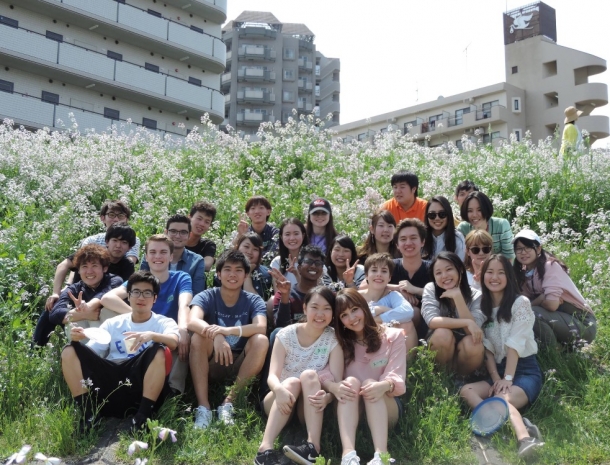
Li Yue (front-most male student in blue T-shirt) and friends he made at Waseda
“Besides being a highly internationalized Japanese university, the other best part about studying at Waseda lies in the university’s location. Waseda is located in the Shinjuku district, in the very heart of Tokyo. There are many internship opportunities that students can find to grow and improve themselves in Tokyo because this is where most headquarters of companies are located. If you are thinking of working in Japan after completing your studies, you want to bear in mind that most job interviews are conducted at the headquarters here in Tokyo. Not to forget that being constantly ranked as one of the best private Japanese universities, if not the best, the Waseda brand gives you tremendous advantage over its counterparts.”
Apart from internships and job opportunities, Li Yue also notes that studying in Tokyo simply adds colors to student life. It is arguably the most happening city in Japan with countless events taking place all year round. Additionally, it is also easy to travel out of the metropolis to other parts of Japan or overseas thanks to its highly sophisticated transportation infrastructure.
Being a resident assistant at WISH
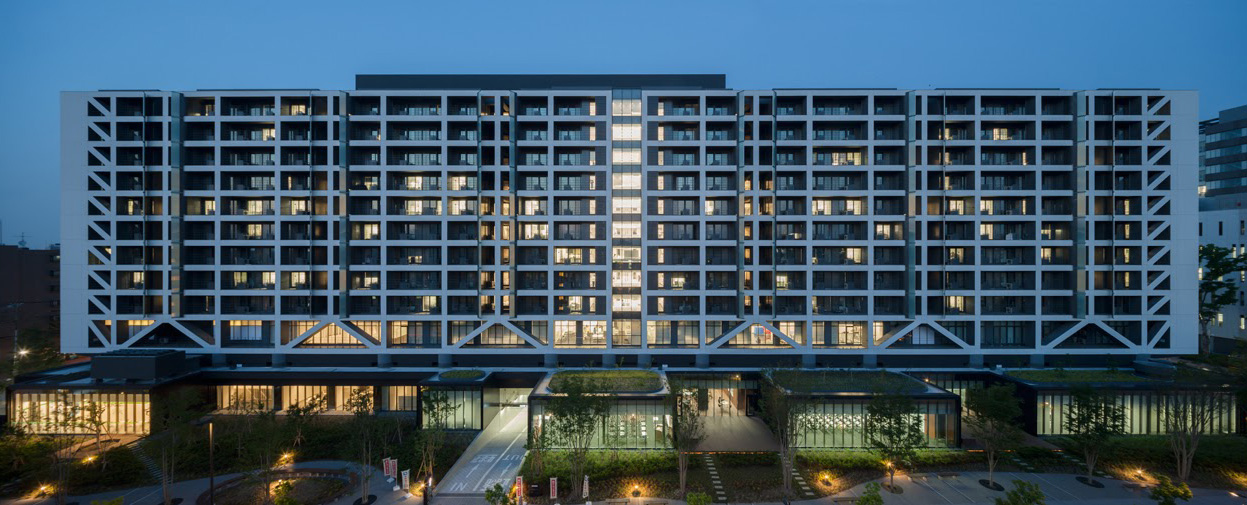
Photo of the exterior of Waseda International Student House (WISH) at dusk
Li Yue lives in the Waseda International Student House (WISH), first as a resident during his first two years of studies but now as a resident assistant (RA).
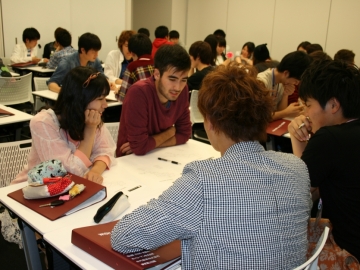
Students engaging in group discussion during SI program at WISH
Launched in March 2014, WISH is an international student dormitory with a total room capacity of 872, where domestic and international students of diverse backgrounds live and interact with one another under one roof. Moreover, the Social Intelligence (SI) program compulsory to all WISH residents intended at cultivating leadership, as well as communication and creative problem-solving skills, are also held at WISH throughout weekdays during term time. Through active participation in the SI program and by living together with students from all over the world, WISH residents can not only further develop their soft skills, but also attain a deep cross-cultural understanding, both necessary to become successful global leaders.
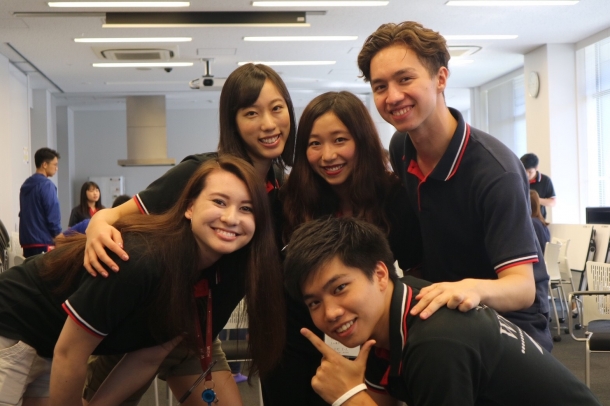
Li Yue (front-right) and four other RAs
“After becoming an RA at WISH, I realized that domestic students and international students need very different kinds of support from us and the university. Waseda takes in many Japanese students from outside Tokyo and one of our jobs is to help these domestic students get used to the city life. On the other hand, we not only need to help international students get use to city life in Tokyo, but also assist them in adapting better into a country that is culturally different from their own. Not to mention that many international students, especially those enrolled in the English-based degree programs, would experience language barrier when they first arrive in Japan. ”
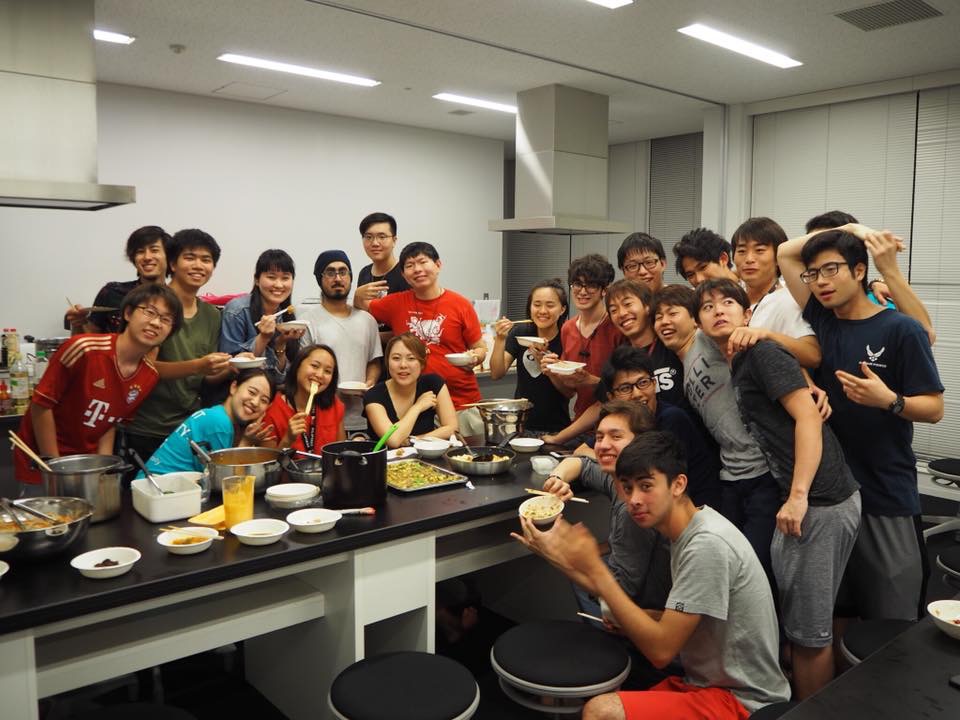
Cooking event organized by RAs for residents at WISH
While the RAs at WISH would always try to make themselves available for consultation and assistance, not all international students would approach them when they need help. As such, Li Yue thinks it is important that he and other RAs stay proactive in communicating with the residents. To build trust with the residents at WISH, the RAs would often organize events to create opportunities for RAs, domestic and international students alike to interact with one another. It could be a sports game event, cultural sharing session through a cooking class or even a language exchange.
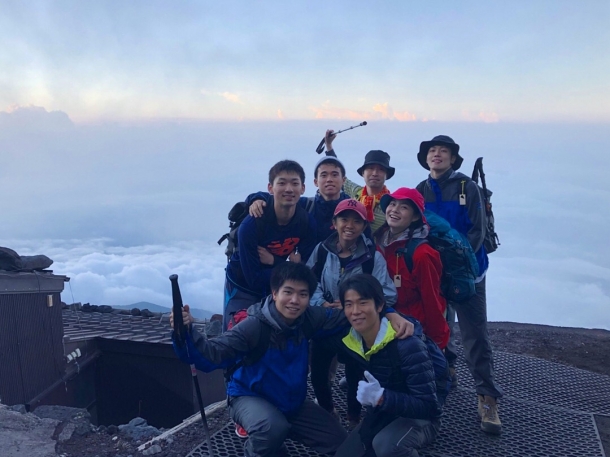
Li Yue (front left) and other WISH residents on Mt. Fuji
“Through participation in events organized by us, I hope residents would not only change their worldview by learning about various cultures and languages, but also treat these experiences as opportunities to reflect upon their very own culture and identity, something that I myself struggled with in the past.”
Wishes for the university
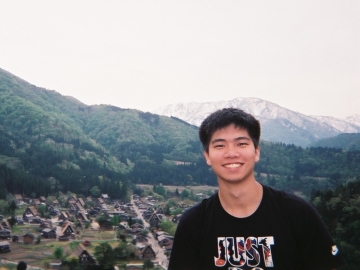
“I think comparing to other Japanese universities, Waseda as a whole is putting in a lot of effort into internationalizing itself and making a name for itself on the global stage. I definitely hope that it would become a university highly recognized by the international community in research and education. But from an international student’s perspective, I would also like to see more student support available in English for international students because some services are only available in Japanese. I could understand that because Waseda is still primarily a Japanese university, most administrative staff are Japanese. However, I do hope to see even more diversity on campuses in future by having more international staff who could provide alternative views and more thoughts to the huge international student body. If Waseda could achieve that, it would certainly achieve true internationalization.”
Advice to prospective and current Waseda students
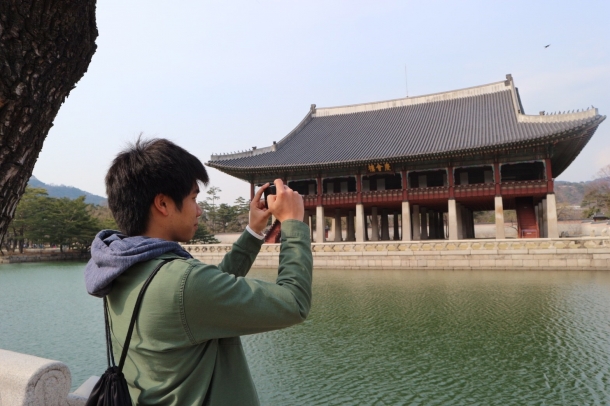
Solo trip to South Korea
“My first advice to students is to travel as much as you can. It can be a domestic travel and you don’t necessarily have to travel out of Japan if you cannot afford to. There are many things that you cannot see on news, from books or the Wikipedia. Sometimes, it is only through travelling that you can truly understand a place, culture, society or how things really are.”
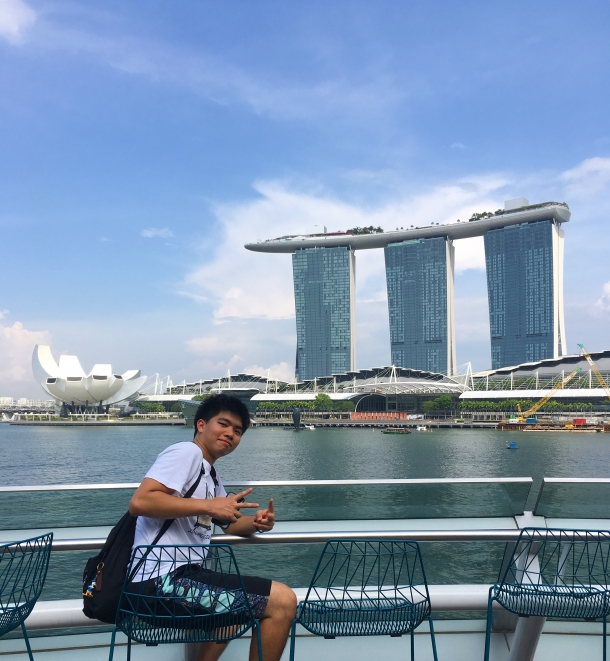
Photo taken opposite Marina Bay Sands, Singapore
To supplement his advice to students, Li Yue gave an example of his trip to Singapore to visit a friend. Situated in Southeast Asia, he had thought Singapore was a very “Asian” country. He was not wrong because geographically, the country is located in Asia and demographically, the Singaporean population is mainly made up of Chinese, Malay and Indian ethnic groups. But when he was there, he recalls seeing many foreigners from western countries working in Singapore. In addition, many people there speak multiple languages and it is not at all rare to see, for example, a person who looks Indian by appearance speaking Mandarin. He stresses that such experiences are very much unimaginable without personally visiting the country.
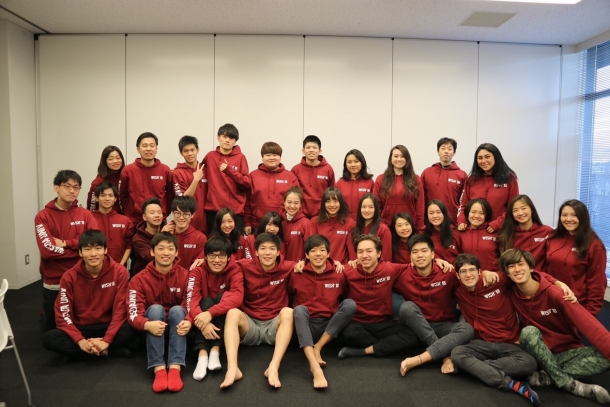
Full member of RAs at WISH
“My second advice to students is to “act first and think later.” Many times when we give too much thought to something, we end up not taking any actions. And as a result, opportunities simply slip away. I think the best part about us being students is that we have more room to fail, unlike adults. Instead of worrying too much about failing or being obsessed with the outcome, why not take it as a challenge to learn and outgrow yourself? By taking the first step to try, you may end up meeting new people who would change the way you see the world. You may also end up opening doors to new opportunities that would have a great impact later in your life you would not have imagined. In any case, nothing would change if you do not act.”


